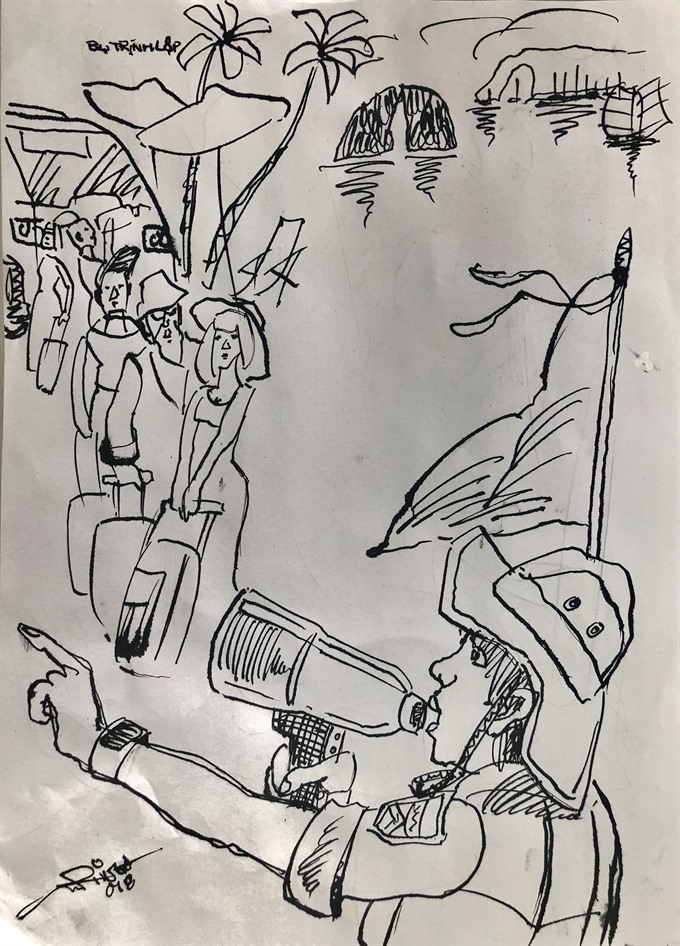 Talk Around Town
Talk Around Town

Tour guides are known as cultural ambassadors for their country and community in the eyes of foreign visitors. Whether guides can deliver quality service to tourists is not only essential to the success of their company — and themselves — but also to the image of the tourism industry in Việt
 |
| Illustration by Trịnh Lập |
By Phương Anh
Tour guides are known as cultural ambassadors for their country and community in the eyes of local and foreign visitors. Whether guides can deliver quality service to tourists is not only essential to the success of their company — and themselves — but also to the image of the tourism industry in Việt
With the aim of encouraging tour guides to improve their performance in order to better meet the needs of travellers, the Việt Nam Tour Guides Association (VNTG) is launching a pilot programme to rank guides on the basis of their capacity, knowledge and skills.
By classifying guides into categories ranging from three to five stars, the VNTG hopes it will be easier for travel firms to hire and pay adequate wages to tour guides.
But the questions persist: Is it really necessary to rank tour guides? And how can something as subjective as tour guide performance be ranked, given that different tourists have different needs and preferences?
Some businesses support plans for this ranking and have been active in organising competitions for guides.
Trần Thị Bảo Thu, marketing and communications director of the Fiditour Travel Company, and Phạm Văn Bảy, deputy director of Vietravel in Hà Nội, told Hà Nội Mới (New Hà Nội) newspaper that they always focused on the quality of tour guides by organising ranking contests to recruit staff.
“After the tests, high qualifiers will be given priority to lead large groups and earn better income,” Thu said.
“Every year we carry out a ranking competition for guides, along with ceremonies to honour the best tour guides to record their achievement and contributions after a working year,” Bảy said.
That’s the perspective of business managers. But what do freelance guides think?
When I asked a freelance tour guide with 30 years of experience for his point of view, Nguyễn Duy Hoài didn’t seem to care much about the plans to rank guides. He said that travel firms were likely to patronise freelance guides with whom they had already worked well for many years.
“The programme that the VNTG proposed may help newbie tour guides and firms but it won’t affect experienced tour guides,” he predicted.
Vũ Tuấn Linh, a freelance tour guide for Italian tourists, said he felt the whole idea of ranking guides was a bit ridiculous.
“If tour guides are ranked with three to five star standard, and then those numbers are attached to their licences to practice, there will be negative comparisons among them,” Linh stressed.
In response to the argument that tour guides would be motivated to improve themselves, he pointed out that there were some guides with five to six years of experience who could not lead big groups, while some of the new graduates were able to guide veritable platoons of 20 to 30 travellers.
Linh stressed that the years of experience did not matter and that “even experienced tour guides don’t dare to say that they will not ever receive any complaints from visitors”.
“There are visitors that go on a tour with a 10-year experienced guide but find it less happy and satisfying than a trip with a guide with two years of experience,” he said.
He said that there are cases in which visitors demand a guide with a great deal of knowledge in history, culture, geography, politics and even religion, but then there are visitors who do not care about those things at all.
“They buy package tours which include tour guides. All they need is somebody to tell jokes, to solve their curious inquiries or handle what happens during the tour, or to take them to underground exciting spots,” he explained.
Hence, it is impossible to accommodate the wishes of all tourists, according to Linh. That means it would be very difficult to properly evaluate and rank a tour guide through a knowledge test and an interview, especially when the performance for those tests is rated during the very limited time of maybe 30 to 45 minutes.
Linh doubts whether there will be anyone qualified enough to classify and rank guides. “When it comes to evaluation, only clients are eligible,” he believes.
“However, it is still difficult to evaluate guides objectively because there are various kinds of visitors.” One example, he said, was that when his teacher led a tour, the travellers told him that all services were very good but they would not mark the ‘Perfect’ box on the tour evaluation sheet, “because nothing is perfect to some people like them”.
"From the perspective of travel firms, there are two traits that make a good guide: local knowledge and the ability to handle a crisis," Nguyễn Công Hoan, deputy director of Hà Nội Redtours Tourism Company, told VietnamNet.
Being knowledgeable is truly an asset “but mainly theoretical, which guides have to achieve to qualify for licences”. Meanwhile, “being able to handle situations is what travel businesses pay attention to and appreciate,” Hoan said.
I couldn’t agree more that improvisational skills are always needed, whether it’s just responding to a minor hiccup in the plan or to a much larger problem.
There are countless situations out there that can happen, and a good tour guide will always find a way to calm people down and make everything right. That skill is only something that can be demonstrated over time, not on a single, short test. VNS




